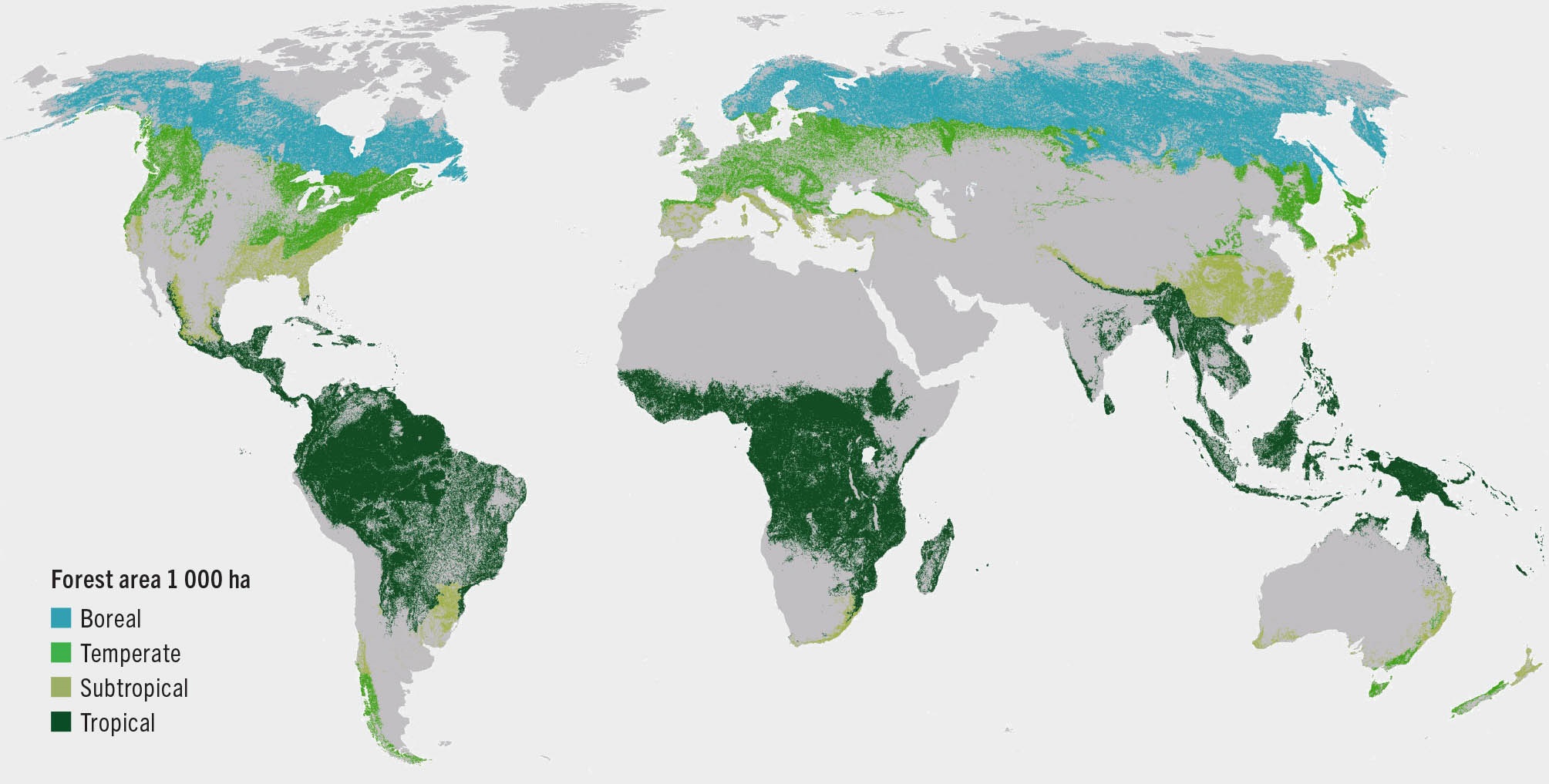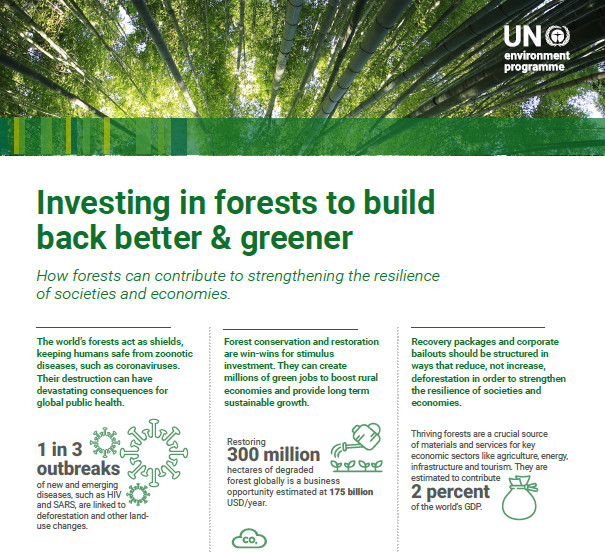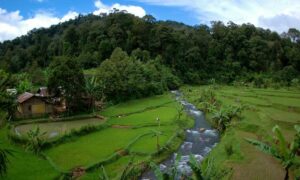Update
Importance of Forests and the Role of Geneva
Forests cover one-third of the Earth's landmass, performing vital functions around the world. Around 1.6 billion people - including more than 2,000 indigenous cultures - depend on forests for their livelihoods, medicines, fuel, food and shelter. Forests are the most biologically diverse ecosystems on land, home to more than 80% of the terrestrial species of animals, plants and insects. Yet, despite all of these priceless ecological, economic, social and health benefits, global deforestation continues. As a global hub for environmental governance, Geneva and the organizations it hosts, plays a role in the protection of forests globally.
Global Distribution of Forests
The Food and Agriculture Organization of the United Nations (FAO) indicates in its 2022 Report “The State of the World’s Forests” that the total forest area is 4.06 billion hectares, covering 31 percent of the Earth’s land surface, not equally distributed around the globe.
The area is shrinking despite efforts to halt deforestation and restore degraded lands, with 420 million ha of forest lost through deforestation between 1990 and 2020. Some 47 million ha of primary forests was lost between 2000 and 2020.
Forests occur in the four major climatic domains (boreal, temperate, subtropical and tropical).
The global distribution of forests, by climatic domain, 2020 [source The State of World Forests 2022]

More than half of the world’s forests are found in only five countries (the Russian Federation, Brazil, Canada, the United States of America and China) and two-thirds (66 percent) of forests are found in ten countries.

International Day of Forests
The United Nations General Assembly proclaimed 21 March the International Day of Forests in 2012. The Day celebrates and raises awareness of the importance of all types of forests. On each International Day of Forests, countries are encouraged to undertake local, national and international efforts to organize activities involving forests and trees, such as tree-planting campaigns. #IntlForestDay

2024 Theme: “Forest and Innovation: New Solutions for a Better World”
Innovation and Technology have transformed countries’ to monitor and report on their forests. 13.7 billion tonnes of carbon dioxide forest emission reductions or enhancements have been reported to the United Nations Framework Convention on Climate Change, thanks to innovative and transparent forest monitoring
With 10 million hectares of forest lost to deforestation and approximately 70 million hectares affected by fires annually, technological innovations are needed for early warning systems for fires and forest loss, and to enable sustainable commodity production.
Technological innovations can empower Indigenous Peoples through mapping and securing customary land. They are custodians of much of the world’s remaining intact forests, and mapping and securing customary lands and enabling access to climate finance can help ensure their crucial role in biodiversity conservation and carbon storage.
Importance of Forests
According to UN-REDD, forests are home to about 80% of the world’s terrestrial biodiversity and an estimated 1.6 billion people use forests for all or part of their livelihoods such as food, shelter, energy and income. Millions, including people in cities, depend on forest resources for clean air and fresh water.
During the day, trees absorb carbon dioxide for photosynthesis and give out oxygen, the air that we breathe. The carbon in forests exceeds the amount of carbon currently in the atmosphere. Forests and forest soils store more than one trillion tonnes of carbon.
Hence, forests play a crucial role in fighting catastrophic climate change by absorbing and storing massive amounts of CO2. In addition, trees could reduce temperatures in cities up to 8°C, lowering use of air conditioning and related emissions by up to 40%. But as we cut them down, oftentimes to make space for agriculture, they lose their ability to regulate the global climate.
During heavy rains, trees reduce the risk of flooding. Experts say that woodland acts as a barrier to floodwater, while trees also prevent soil erosion, reducing sediment going into rivers and increasing water absorption into the ground. Forests can also retain excess rainwater, prevent extreme run-offs and reduce the damage of flooding. They can also help mitigate the effects of droughts by releasing water in the dry season, forests can also help provide clean water and mitigate the effects of droughts.
Furthermore, more than a quarter of modern medicines, worth an estimated US$ 108 billion a year, originate from tropical forest plants.
Build Back Better and Greener
Forests, through their ecosystem services, are a key nature-based solution for rebuilding the global economy post-pandemic in a way that preserves nature, while fostering growth. The United Nations Environment Programme (UNEP) provides some key insights on how forests can help make us more resilient in the longer term.


Role of Geneva
International Geneva
Geneva and its surrounding area host important international organizations working on forests, presented hereafter by alphabetical order.
Convention on International Trade in Endangered Species (CITES)
CITES is an multilateral agreement aiming to ensure that international trade in specimens of wild animals and plants does not threaten the survival of the species. CITES regulates the international trade of close to 800 tree species, as well as other fauna and flora species occurring in forest ecosystems. The Convention contributes to the long-term conservation and sustainable use of the world’s forest resources through its species-specific focus.
Earthworm Foundation
Earthworm Foundation, formerly The Forest Trust, works to preserve forests and oceans, while empowering the people that care for our lands and produce our everyday needs. Their projects contribute to a world where forests are a boundless source of materials and a home for biodiversity; communities see their rights respected and have opportunities to develop; workers are seen as productive partners; and agriculture becomes the instrument to feed a hungry planet and keep our climate stable.
Franklinia Foundation
Fondation Franklinia is a private foundation established in 2005 under Swiss law. It provides grants to support nature conservation projects. Its objective is to preserve threatened tree species throughout the world and improve their conservation status.
Food and Agriculture Organization of the United Nations (FAO) Liaison Office Geneva
The Food and Agriculture Organization of the United Nations (FAO) is a specialized agency of the UN with a membership of 194 Member States that leads international efforts to eradicate hunger and malnutrition, and for the sustainable management and utilization of natural resources. Its goal is to achieve food security for all, where everyone has regular access to enough high-quality food to lead active and healthy lives. The FAO Liaison Office in Geneva (FAO Geneva), located in the historical Palais des Nations, is one of more than 130 FAO offices worldwide, working with partners to achieve this goal and the wider sustainable development agenda.
International Union for Conservation of Nature (IUCN)
IUCN works to build sustainable landscapes, protect primary forests and advance the rights of forest communities. Through its forest initiatives, the IUCN helps countries implement effective forest and land-use policies, achieve national priorities and meet international commitments on climate change, biodiversity and land degradation.
Programme for the Endorsement of Forest Certification (PEFC)
The Programme for the Endorsement of Forest Certification (PEFC), is a leading global alliance of national forest certification systems. As an international non-profit, non-governmental organization, PEFC is dedicated to promoting sustainable forest management through independent third-party certification.
Right Livelihood
The Right Livelihood Foundation promotes scientific research, education, public understanding and practical activities contributing to a global ecological balance; lasting peace and justice; and that are aimed at eliminating material and spiritual poverty through the Right Livelihood Award. Over the years, various Right Livelihood Laureates have dedicated their work to reforestation, helping to restore over 6 million hectares of degraded land.
United Nations Conference on Trade and Development (UNCTAD)
In 1996, UNCTAD launched the BioTrade Initiative to support the objectives of the Convention on Biological Diversity. BioTrade refers to those activities of collection, production, transformation, and commercialization of goods and services derived from native biodiversity under the criteria of environmental, social and economic sustainability. This includes activities relying on forests and supporting the livelihoods of the people living in or adjacent to forests.
United Nations Development Programme (UNDP) Office in Geneva
The UNDP Climate and Forests Team supports countries with the design and implementation of national policies and measures to reduce deforestation and manage forests sustainably, hence contributing to the mitigation of climate change and advancing sustainable development. The global team has advisors in various duty stations, including Geneva.
The Central African Forest Initiative (CAFI) Secretariat, hosted by UNDP Office in Geneva, is an initiative and fund to support the implementation of strategic reforms and multi-sectoral investments for the sustainable management of forests and REDD+ results in the Central African region. CAFI, as a collaborative partnership, gathers 6 Central African countries with high forest cover (Cameroon, Central African Republic, Republic of the Congo, DR Congo, Equatorial Guinea and Gabon), a coalition of donors (EU, France, Germany, Norway, UK, the Netherlands and South Korea) and a South-South partner (Brazil).
United Nations Economic Commission for Europe (UNECE)
The joint UNECE/FAO Forestry and Timber Section supports developing evidence-based policies for sustainable forest management and to communicates about the many products and ecosystem services provided to society while assisting countries of the region to monitor and manage forests.
United Nations Programme on Reducing Emissions from Deforestation and Forest Degradation (UN-REDD)
The UN-REDD Programme was launched in 2008 and builds on the convening role and technical expertise of the Food and Agriculture Organization of the United Nations (FAO), the United Nations Development Programme (UNDP) and the United Nations Environment Programme (UNEP). The Programme supports nationally led REDD+ processes and promotes the informed and meaningful involvement of all stakeholders, including indigenous peoples and other forest-dependent communities, in national and international REDD+ implementation. Additionally, the programme supports national REDD+ readiness efforts in 65 partner countries, spanning Africa, Asia-Pacific and Latin America.
World Business Council for Sustainable Development (WBCSD)
The Forest Solutions Group (FSG) of the World Business Council for Sustainable Development (WBCSD) is the global platform where business in the forest products value chain build and share solutions to lead sustainable development in the forest sector. FSG’s mission is to advance the bioeconomy and a thriving forest sector that sustains healthy productive forests and people’s well-being.
World Economic Forum (WEF)
The World Economic Forum (WEF) developed Strategic Intelligence that provides insights and contextual intelligence to explore and monitor the issues and forces driving transformational change across economies, industries, and global issues, among them, forests. The WEF hosts platforms supporting reforestation.
- 1t.org | 1t.org is a World Economic Forum initiative, designed to support the trillion tree community. 1t.org is a platform for leading governments, businesses, civil society and ecopreneurs committed to restoring and reforesting the planet.
- Tropical Forest Alliance | The Tropical Forest Alliance is a multistakeholder partnership platform initiated to support the implementation of private-sector commitments to remove deforestation from palm oil, beef, soy and pulp/paper supply chains. Hosted by the World Economic Forum, the 170+ alliance partners include companies, government entities, civil society, indigenous peoples, local communities and international organizations, working together through Forest-Positive Collective Action to advance the world’s transition to deforestation-free commodity supply chains.
WWF International
WWF has been working on forest issues for 50 years. It has supported the creation of protected areas, helped move the forest sector towards sustainability and transparency, and working across the world to halt deforestation, help restore forests and put deforestation-free commitments into action.
Local Geneva
Canton of Geneva
Geneva is active in protecting biodiversity and forests, especially due to their proximity to the urban areas. While the human population is close to nature, it also induces significant pressures on the environments. As proposed in Geneva’s Strategy Plan on Biodiversity, it is essential to promote biodiversity at every scale, from land use planning to concrete achievements in neighborhoods or gardens. In addition, te forest reserve of the Grand Bois de Satigny was established by Geneva’s Conseil d’Etat on 23 May 2018. With nearly 100 hectares, it is one of the largest integral forest reserves in the Swiss Plateau, thus meeting the recommendations and priorities of the Swiss Confederation. All logging and active management of natural environments is prohibited in this reserve. The reserve remains fully open to the public and will offer future generations the opportunity to discover a large space devoted entirely to nature and its natural evolution.
City of Geneva
Renowned for its parks, the City of Geneva has also approximately 70 hectares of forests, managed in an optimal and ecological way.
Faune Genève
Faune Genève is a non-profit association aiming at protecting and raising awareness on the fauna of Geneva. Its website is an official platform for naturalists and wildlife observers in the region.
La Libellule
La Libellule is a non-profit association raising public environmental awareness through field activities, mainly in the Geneva region.
Pro Natura
Pro Natura is the oldest nature preservation organization in Switzerland, with several protected sites with important wildlife such as the Centre Nature Vallon de l’Allondon and the Centre Nature de la Pointe à la Bise in Geneva.
WWF Geneva
WWF Geneva works to implement projects in support of biodiversity, which includes a Panda Club that organizes outings and activities for young people on environmental issues.
Learning

Fundamentals on REDD+
Online | UN-REDD+

Advancing on REDD+
Online | UN-REDD+
Past GEN Events

Wednesdays for the Planet | Our Planet – Forests
04 Nov 2020 | Online

Investing in forests | the man who stopped the desert and the forest maker
27 Nov 2018 | International Environment House I

Forests | Nature at Your Service | World Environment Day Roundtable
06 Jun 2011 | International Environment House II

Towards a new international regime on forests
05 Jul 2006 | International Environment House
Resources
- International Day of Forests | FAO
- International Day of Forests | United Nations
- Les visites en forêt sont bonnes pour la santé | Swiss Federal Office for the Environment | 16 March 2023
- International Day of Forests: Statement of the Executive Secretary of the Convention on Biodiversity | 21 March 2022
- Forests in a nutshell: discover the lesser-known story behind some of your favourite dishes on International Day of Forests! | UNECE
- Guidelines on the Promotion of Green Jobs in Forestry | UNECE | February 2021
- Wednesdays for the Planet: Forests | Geneva Environment Network | 4 November 2020
- FAO Interactive Tool to Explore Forests | FAO | 2020
- Global Forest Resources Assessment 2020 | FAO

